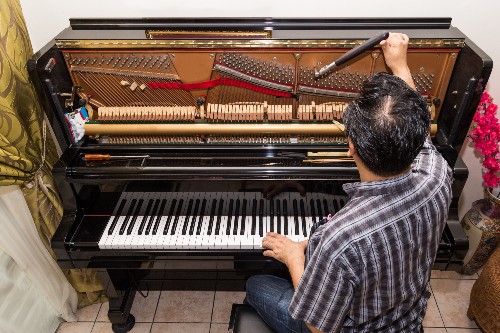 A quality piano crafted to perfection, positioned in the right place, and tuned correctly, produces incredible sounds. The music from such an instrument inspires a love for music. Over time, your piano’s sound quality will change, and that once beautiful music will now repel listeners.
A quality piano crafted to perfection, positioned in the right place, and tuned correctly, produces incredible sounds. The music from such an instrument inspires a love for music. Over time, your piano’s sound quality will change, and that once beautiful music will now repel listeners.
Continuing to produce reliable, accurate notes is crucial to a functioning instrument. Maintaining a piano is an important part of owning it, but piano tuning doesn’t have to be preventatively expensive. Even as a non-technical person, there are signs to look for to diagnose an out-of-tune piano that won’t waste your money.
Keep reading to learn the tests to see if your piano is out of tune.
1. Where is Your Piano’s Pitch?
You can check if your piano produces the correct pitch. You will need to investigate if the vibration rate of a note compares to a standard rate of vibration. The most used test note is A-440, or “concert pitch. Find the “A” note about the middle “C” note to find the A-440. If in tune, this note will vibrate at a rate of 440 times/second.
2. Test Notes Against Themselves
Just about every note on your piano requires more than one string to operate. When in tune, the strings vibrate at the same rate to produce a single note. When out of tune, there will be a wavering sound. This wavering will distort the note creating an uncomfortable sound. The competing strings may even cancel out the sound.
3. One Octave Should Blend Into the Following Octave
When tuned properly, a piano’s notes should line up across all the octaves — increasing an octave multiples the frequency of a note whereas decreasing an octave halves the frequency. We already mentioned A-440. One octave up would be A-880, and an octave down from the original would be A-220.
The most common problem that impacts the octave issues are temperature and humidity changes. To check if you have this problem, try pressing the far right pedal, then playing the same note in three different octaves.
4. Major Chords Should Sound Harmonious
Most three-note major chords sound harmonious as if seamlessly blended. When any note is out-of-tune, there will be a noticeable, disruptive difference. Check-in on the major chord harmony by playing the middle C, the E two keys to the right, the G two more keys to the right, and the C three keys to the right of that. If this sound flows, great, but if you hear something unpleasant, you may need to have your piano tuned.
Getting Professional Help with Piano Tuning
Try out this do it yourself test at home every month or so to test your piano. If you notice anything strange, make sure to call in a professional tuner. Even if you don’t notice an issue, make sure to have an experienced technician check out your instrument every six months. The piano experts at Evola Music can diagnose your piano’s issue and make the necessary adjustments. If you need a teacher to take your playing to the next level, check out our options.
Check out our team at Evola Music today at the nearest location to you.
